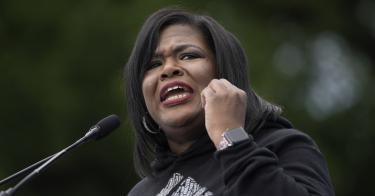Rep. Byron Donalds (R-FL) appeared to be genuinely dismayed by the nastiness of the comments of his colleague Rep. Cori Bush (D-MO) after he was nominated to be House speaker this month. He needn’t have been. Bush did the country a favor by giving us a lesson on the hollowness of such terms as diversity, equity, and inclusion.
We owe her.
Donalds, you see, is a black man representing Florida’s 19th District, while Bush is a black woman representing Missouri’s 1st District. There the similarities end, and it’s not just because he’s a Republican and she's a Democrat.
Donalds displays an interest in improving America. Bush, however, is committed to replacing the country’s entire narrative—its whole conceptual apparatus. This much was evidenced by the tiff itself.
>>> Homeland Security’s “Equity Action Plan” Doubles Down on Discrimination
The spat ensued after Donalds was proposed as speaker on Jan. 4 during the tense days when Rep. Kevin McCarthy’s (R-CA) nomination seemed to be on the balance. McCarthy eventually won in the early hours of Jan. 7 and is now speaker.
Pundits inevitably made an issue of Donalds’s race and of the fact that the lawmaker the Democrats proposed, Rep. Hakeem Jeffries (D-NY), is also black. “It was the first time two black candidates for speaker of the House … were nominated simultaneously,” averred Fox News.
It was at that point that Bush channeled her inner mean girl and tweeted, “FWIW [For What It’s Worth], @ByronDonalds is not a historic candidate for Speaker. He is a prop. Despite being Black, he supports a policy agenda intent on upholding and perpetuating white supremacy. His name being in the mix is not progress—it’s pathetic.”
Donalds took the high road, tweeting, partly, “I’d be happy to sit down and debate our policies one on one whenever you’d like.” But the rest of the tweet conveyed obvious disappointment that Bush had taken the low road, an expression of regret that he later expanded on in& an interview with Fox News’s Stuart Varney.
“It was just blatantly outrageous. Man, that sucks, to be honest with you. I’m sorry. I feel bad that she really put that out there,” Donalds told Varney. “Specifically to my policies, I would argue that she should sit down and debate me one on one. And let’s do that. We can do it on your program, we can do it on CNN, we can do it on MSNBC—I’m open to all of that. But to throw a statement out there, I thought it was just the complete wrong thing to do. As a black man to a black woman, I would have never done that to her. It’s a shame that she did it to me.”
There was no sign from Bush that she will take Donalds up on his offer of a debate on the merits of policy. If anything, she poured more scorn on him, tweeting at Donalds on Jan. 5, “You’re being used. It helps you politically at the expense of our community. THAT’S what’s shameful. It’s clear which party promotes white supremacist chaos and which works against it.”
Bush’s repeated use of “white supremacy” explains the divide here. The term does not actually mean ugly people who think that white people are superior to other races—that’s too “reductive,” as we will see. According to leftists like Bush, “white supremacy” is actually all of American society—its institutions, values, and every single person in it who doesn’t want to tear it all down.
It means all the West, actually. As Robin DiAngelo, a sought-after “anti-racism ” trainer who held a workshop with the House Democratic Caucus in the fall of 2020, helpfully explained in her bestseller White Fragility:
White supremacy in this context does not refer to individual white people and their individual intentions or actions but to an overarching political, economic, and social system of domination. Again, racism is a structure, not an event. While hate groups that openly proclaim white superiority do exist and this term refers to them also, the popular consciousness solely associates white supremacy with these radical groups. This reductive definition obscures the reality of the larger system at work and prevents us from addressing this system.
Racism, you see, is embedded “in the ordinary business of society—the routines, practices, and institutions that we rely on to effect the world’s work,” as critical race theory pioneer Richard Delgado once put it.
>>> DeSantis Tackles Divisive “Diversity, Equity, and Inclusion” Programs on College Campuses
That’s why people like Bush want to bring the entire system down. Talking with Donalds about the contours of policy would be superfluous.
Diiversity, according to the Left, is not about bringing people of different races and national backgrounds into the room. It’s about making sure that people with uniformity of views sit at the decision-making table. Black Americans such as Donalds, Supreme Court Justice Clarence Thomas, or conservative commentator Candace Owens think for themselves and are thus not needed. Worse, they’re race traitors.
As Katharine Gorka and I described in a paper late last year, the Left’s DEI agenda corrupts all three words. Quoting James Lindsay, Bruce Gilley, and Peter Boghossian, we explained that diversity means “an identity-based approach to society … enforced intellectual conformity; political quotas.” Equity means the opposite or equality of treatment. Inclusion means “restricted speech and justification for purges.”
Rather than lament Bush’s outbursts, we should thank her for making this clear.
This piece originally appeared in the Washington Examiner




